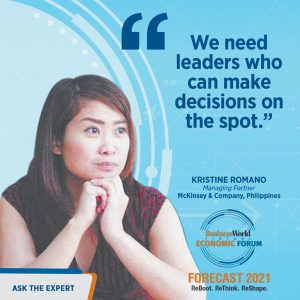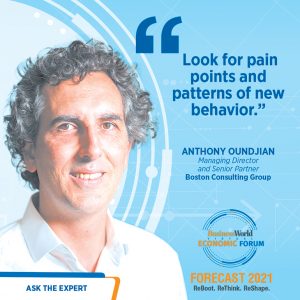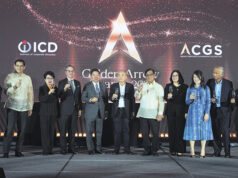Experts’ thoughts on the road ahead for businesses and reimagining the future
By Adrian Paul B. Conoza, Special Features Writer
As the current pandemic caused widespread impacts across various industries and demographics, consulting firms have taken a deeper look into these impacts and thereafter have assessed the direction ahead for businesses and consumers.
The “Ask The Experts” segment during the BusinessWorld Virtual Economic Forum last Nov. 25 and 26 gathered insights from executives of two consulting firms regarding the findings and outlook of their firms in light of the coronavirus disease 2019 (COVID-19) pandemic. Kristine A. Romano, managing partner of McKinsey & Company, Philippines, and Anthony Oundjian, managing director and senior partner at Boston Consulting Group (BCG), each shared their perspective on the road ahead for businesses in the new normal, aside from presenting what their firms discovered about the pandemic’s impacts.
Agility in boosting consumer confidence
During the virtual forum’s first day, Ms. Romano of McKinsey & Company highlighted the macroeconomic scenarios and consumer and corporate trends spotted by the firm.
Regarding the macroeconomic scenario, Ms. Romano shares that the most likely scenario for the Philippines shows the country’s gross domestic product staying below the previous growth trajectory. It is projected to return to pre-pandemic levels at around the third quarter of next year and past the county’s growth targets starting 2022.
This outlook, as the managing partner shared, is based on an outlook that integrates an effective public health response amid recurring adverse health impacts and ‘partially effective economic interventions.’
Ms. Romano pointed out two reasons for this scenario. One is the expected distribution of vaccines in the country by end-2021 or early-2022. The other concerns a lowered consumer confidence observed among Filipinos in the past months — which was further highlighted during Ms. Romano’s discussion.
McKinsey’s study highlights that Filipinos are found to be less optimistic of their own country’s economic recovery than neighbors around the world. Only 42% of Filipinos considered themselves optimistic, 9% are pessimistic, and 49% are unsure. Ms. Romano also added that “40-60% are strongly agreeing that their jobs, their livelihood, and [they] personally have been affected by the pandemic.”
Furthermore, she shared that since March, the country experienced a decline in consumer confidence. At March, confidence among Filipinos was at 57%, then it dropped to 42% in April and October. This was compared to China, which recorded a steady increase in confidence — from 48% in March to 56% in April then 58% in September.
 “Consumer confidence has taken a hit, and it will require a big jolt for us to get that back into 2021. I am really hoping that the Christmas season will put us back in the mood to spend again,” Ms. Romano said.
“Consumer confidence has taken a hit, and it will require a big jolt for us to get that back into 2021. I am really hoping that the Christmas season will put us back in the mood to spend again,” Ms. Romano said.
She also shared several behavioral changes among Filipino consumers, such as increased use of contactless and mobile payments.
Trends in the ASEAN region, which are seen to propel the economic region’s growth in the coming years, were also shared. Ms. Romano shared that there is an opportunity for the region to advance as manufacturing hubs, to invest more in basic and green infrastructure, to build high-value food industries, to prepare companies for a digital future, and to facilitate reskilling and redeployment at scale.
Ms. Romano advised decision-makers to put in place longer-term interventions to boost consumer confidence. “On one hand, you could give away money, which, yes, works. But at the end of the day, what brings confidence is also how we communicate and how we create lighthouses of success,” she said.
For businesses, meanwhile, safety and localization are considered the biggest drivers of consumer consumption.
Furthermore, businesses are encouraged to adapt fast. “We need to have leaders who can make judgment calls on the spot… We need to be much more dynamic and not hierarchical,” she said. “Every company now needs to be equally agile, because you’re getting thrown so much uncertainties… that decision-making cannot be just done by one brilliant guy at top, but we have to figure out a way to empower the frontline.”
Imagination as a key to recovery
BCG’s Mr. Oundjian, meanwhile, stressed that after efforts of reacting and responding to the pandemic’s disruptions, it is time for businesses to reimagine their new future. “Reimagination is the next step, which is about acknowledging that the world is going to be different [so we should] rethink of business accordingly,” Mr. Oundjian said.
He shared several triggers of unlocking ideas and reinventing a business. This includes the notion of seeking surprise, wherein organizations spot accidents, anomalies, and analogies and developing an idea out of patterns. Other triggers include ‘probing the world’ to find new pain points; ‘facilitating contagion’ by creating a contagious culture of innovation and sharing ideas; and ‘writing the recipe’, wherein organizations codify successful practices to form new systems.
 In addition, Mr. Oundjian shared ‘firestarters’ to rekindle imagination, which include: using the current crisis, getting into the real world by getting feedback from consumers, establishing an ideal, encouraging dreaming, making heroes of internal entrepreneurs, and trying bold new things.
In addition, Mr. Oundjian shared ‘firestarters’ to rekindle imagination, which include: using the current crisis, getting into the real world by getting feedback from consumers, establishing an ideal, encouraging dreaming, making heroes of internal entrepreneurs, and trying bold new things.
“The crisis is really a time to reinvent yourself,” Mr. Oundjian shared. “I’ve seen that in many of our clients here in the Philippines, who have been forced to accelerate their digital transformation, who have changed their delivery model, who have changed their engagement model with their employees, and after this react, they actually put in place stronger processes,” he said.
For Mr. Oundjian, reimagining will help businesses in planning for recovery and ensuring resilience in the future. “We’re already past the react phase. We’re at least in the rebound, and I think we need to be more and more in the reimagine phase,” the BCG managing partner stressed.
As the country waits for COVID-19 vaccines to come in the country, he continued, companies are advised to bear the next six to 12 months while ensuring the employee safety and positive cash flow, alongside making the right adjustments.
“It’s really time to think about what kind of changes in consumer behavior will last beyond this crisis and to adopt and to prepare for this new normal,” Mr. Oundjian added.
He also expressed his confidence in the Philippines returning to a trajectory of growth and opportunities for its citizens. “We’re still a young population, we’re still very digital… we’re resourceful. So, we’re going to get back. The question is how quickly and how much,” Mr. Oundjian said, adding that Filipinos have a bright future ahead given that businesses have shown that they can adapt and create new opportunities for themselves.


